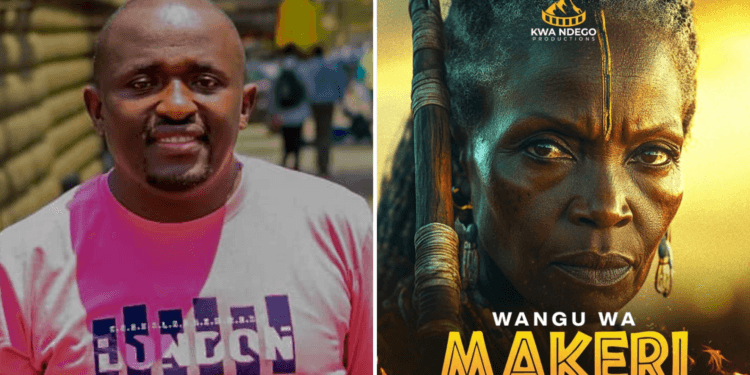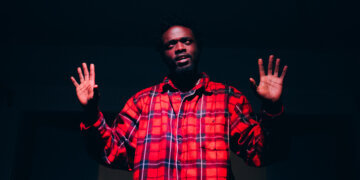Wangu wa Makeri is both a villain and a hero in her own story, Lawrence Murage – the writer, director, and co-producer of Kwa Ndego Productions’ upcoming eponymous musical play – tells me over the phone during our interview. “Come watch the play and see what I mean,” he adds.
The iconic chief was the only female Kikuyu leader during British colonial rule in Kenya. She is disliked as a historical character, especially in a patriarchal society where women are expected to be submissive, yielding, pleasant, and beyond moral reproach. Wangu loved wielding the power bestowed upon her as a headman. She became a ruthless enforcer of British colonial rule, an authoritarian tax collector who even used her subjects as seats. And yet, Wangu was a functional headman of her time. Every other headman did the same thing she did, if not worse. Paramount Chief Karuri wa Gakure (rumoured to be Wangu’s lover) who recruited her into the role and amassed significant power and wealth through his colonial connections, has retained a name that Wangu does not.
So why does Wangu get all the bad rap in history? Kwa Ndego promises to explore this question when the play hits the Kenya National Theatre from 2 to 4 May 2025. Lydia Gitachu (Kina) will take on the lead role of Wangu Wa Makeri, opposite Kimiti wa Gitau as Paramount Chief Karuri wa Gakure and Nelex Nderitu as Wangu’s husband, Makeri wa Mbogo.
“Kwa Ndego started as a web series production,” Murage recalls. Founded in 2023, the production was born out of the desire to continue the path laid by Kenya’s leading playwright Ngũgĩ wa Thiong’o and his contemporaries over four decades ago: to bring vernacular storytelling to the masses. Vernacular, in this case, the Gikuyu language.
“The name ‘Kwa Ndego’ is a very popular phrase among the Gikuyu,” says Murage. “It’s a fictitious place Gikuyu mothers used to sarcastically say they were going to when asked. You would find a parent in Kiambu, Nyeri, Murang’a… saying the same thing, but no one ever knew where Kwa Ndego was.”
Their first play, Hutia Kirima (Touch the Mountain), a comedic reimagining of the Jesus story, was staged at the Kenya National Theatre in November 2024. “We did the play in a localised way that an ordinary Gikuyu would understand,” Murage says. Their second play, Uga Ng’we, was performed in February 2025, also at the Kenya National Theatre. Both productions were Gikuyu-language comedic musicals.
Of all the sub-genres of theatre, the musical theatre best marries traditional African performances with the modern European-style drama. It’s the most seamless way to integrate the chants, dirges, and dances— the hallmark of the continent’s performing arts—with the highbrow Western stage acting. It’s fitting, then, that Wangu – the woman who danced her way to unemployment (she resigned after dancing kibata, considered a male dance among the Gikuyu) – should be brought back to life through a musical theatre biopic.
From Malcolm X to Oppenheimer to Elvis to A Complete Unkown, biopics are very popular in Hollywood. But long before man learned how to manipulate light to create motion pictures, the biopic was already a dominant force on the stage, with plays like William Shakespeare’s 16th-century biographical tragedy, Julius Caesar, being one of the earliest and most enduring examples of a theatrical biography.
Like its cinematic counterpart, biographical plays are often a sure way to attract audiences as familiarity with the subject creates built-in interest. Humans, after all, are also naturally curious beings– we love to peek behind the curtains of famous lives.
Murage, however, says that Kwa Ndego’s decision to bring Wangu wa Makeri to the stage was less motivated by the promise of commercial success, as enjoyed by previous theatrical biopics like Too Early for Birds’ Tom Mboya, and more about leaning on the production’s founding pillar: to tell indigenous stories. “We realised we aren’t telling enough stories about our historical figures… the Wangu wa Makeris, the Mugo wa Kibirus…”
Looking at it from a distance, biopics – whether in film or on stage – might seem easy to create. After all, the narrative arc is already built in: from birth, rise, potential fall, and death, essentially providing source material that alleviates much of the storytelling burden from writers. But that’s not to say bringing such stories to life is easy. Murage describes the scriptwriting process for Wangu wa Makeri as “interesting.” The research took the team deep into Wangu’s roots, including a visit to her ancestral village in Murang’a to speak with her surviving kin.
“We went to her village, Weithaga, where she used to live and talked to this 96-year-old man who knew Wangu when she was alive,” Murage says.
Did they learn anything from this visit that’s not available in the history books? “A lot,” Murage says. “There’s a lot out there that you cannot find in any book. The Gikuyu traditional storytelling was oral, passed down by word of mouth, so to get to the authentic Wangu wa Makeri story, we had to find someone who at least knew someone who knew her personally. We’ll be showcasing all of that in the show.”
This visit yielded more than even national institutions like the Kenya National Archives. “We combed through every article, but most of the information was surface level,” Murage says, adding that the most useful resource they found at Kenya National Archives was Mary W. Wanyoike’s 1995 entry to the Makers of Kenya’s History series, titled Wangu wa Makeri.
Unlike previous historical plays like Tom Mboya, Kwa Ndego is steering away from present-day politics with this show. “This is not a political show,” Murage declares. “We just want to tell our stories, through our lens, and as authentically as possible.”
Though based on real events, the production is taking creative liberties with the narrative to captivate the audience. “This is the stage, we have the creative freedom to create, recreate, and tell the story in a way that’s relevant right now,” Murage says, promising that the play will be more than just a history lesson on the life of Wangu despite its historical grounding. “We want our audience to be entertained therefore we want to tell an engaging story that blends traditional and modern elements.”
Murage, whose works include writing credits on Njoro wa Uba and Varshita and Showmax film Baba Twins (which he also directed), was inspired by Lin-Manuel Miranda’s Hamilton. Another major influence is Lwanda Rockman, a play about the legendary Luo warrior Lwanda Magere, written and directed by JJ Jumbi.
Don’t expect Kwa Ndego to stage an English or Kiswahili version of the show. “It’s been a conversation at our production table, but there are no plans for it. We’ve talked about it but it’s not happening anytime soon.”
In a nutshell, what’s Kwa Ndego is promising those who attend their show at the Kenya National Theatre in May is “a rich, immersive, theatrical performance.” “This will be a powerful Kikuyu-language play based on the real-life story of Wangu wa Makeri, dynamic storytelling, music, and choreography and more,” Murage says.
Enjoyed this article?
To receive the latest updates from Sinema Focus directly to your inbox, subscribe now.











